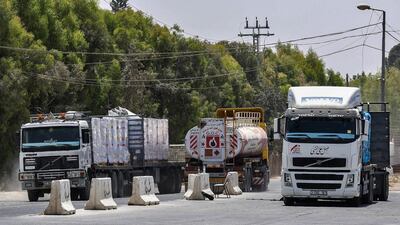The Palestinian economy is expected to slow down further this year as challenges in Gaza weigh down on its outlook and the World Bank is set to increase its yearly allocation to the Palestinians.
Palestine's gross domestic product, adjusted for inflation, will decelerate to 1.5 per cent in 2018 from about 3 per cent last year, said Karen Ongley, who led an International Monetary Fund team to the territories. The IMF urged for a reduction in budget deficit and an engaged donor community to help bridge large financing gaps.
"With pressures on the economy continuing to mount, the outlook has become more fragile and uncertain," Ms Ongley said. "Gaza is unlikely to register positive growth over the medium term without a profound and lasting change in circumstances."
The comments followed the IMF's 12-day visit to East Jerusalem and Ramallah starting July 8 to assess economic progress in the West Bank and Gaza. The Gaza economy, strangled by years of blockades, shrank by 6 per cent in the first quarter, according to the Fund. Growth in the West Bank was close to 5 per cent. About 30 per cent of Palestinians are unemployed and half of Gaza's population is jobless, the World Bank said.
______________
Read more
UN General Assembly blames Israel for Gaza violence
UN inquiry approved into killing of Palestinians at Gaza fence
Arab League demands international probe into Israeli crimes
______________
Against this "alarming" economic background, the World Bank increased its yearly allocation to Palestinians to $90 million from $55m, it said on July 24.
"In Gaza, the magnitude of the challenges has left the territory on the verge of economic and social collapse, with a serious decline in living conditions," the bank said.
The IMF called for a medium-term plan to gradually reduce the budget deficit as part of a comprehensive strategy to lift the territories' growth permanently. It also urged the Palestinian Authority to undertake a mix of revenue and expenditure measures, while implementing reforms to manage public finances.
An active donor community is needed to help plug financing gaps and build necessary institutions while supporting an ongoing dialogue between the two sides of the conflict.
"We recognise that the full potential of the economy will not be achieved without a political settlement," said Ferid Belhaj, World Bank group vice president for Middle East and North Africa. "Yet, more can be done to support the well-being of the Palestinian people who have faced more than a decade of stagnant growth and stubbornly high unemployment.”


